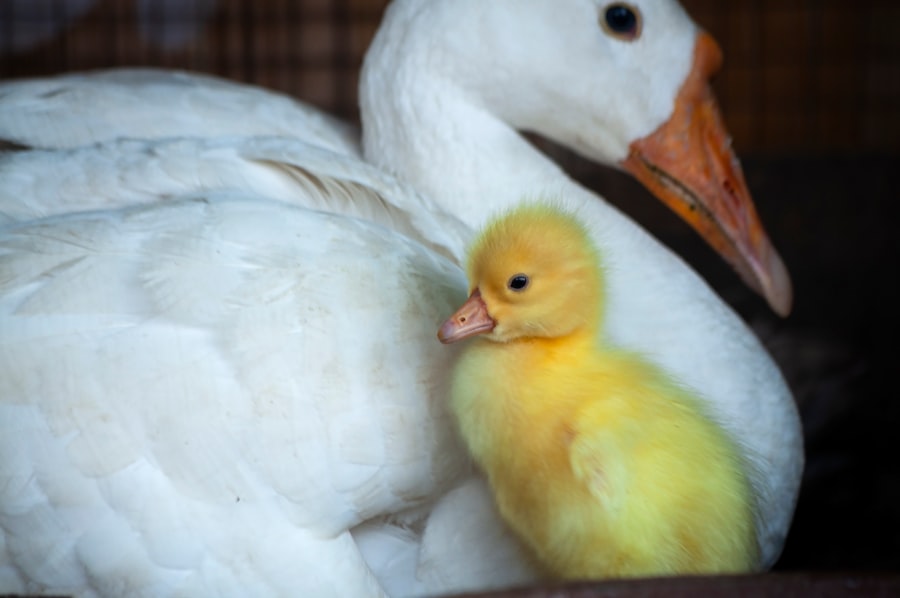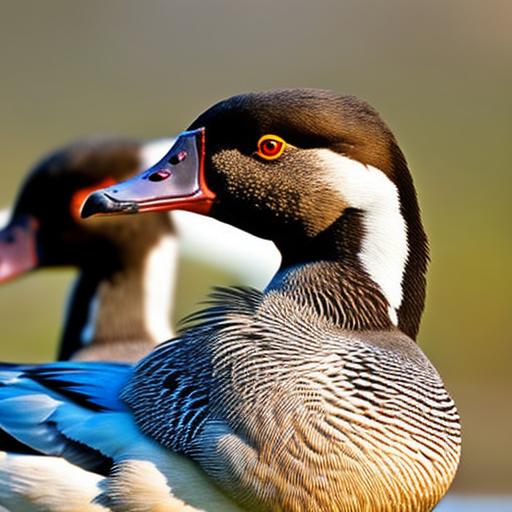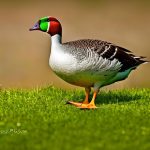Keeping ducks and geese together can be a rewarding experience for any poultry enthusiast. Both ducks and geese are social animals that thrive in the company of their own kind, and they can also coexist harmoniously with each other. Ducks and geese are known for their friendly and curious nature, making them delightful additions to any backyard or farm. By understanding their behavior, needs, and social dynamics, you can create a suitable living environment for them and ensure their health and well-being. In this article, we will explore the ins and outs of keeping ducks and geese together, including their behavior, living environment, feeding and nutrition, health considerations, and managing their interactions and social dynamics.
Key Takeaways
- Ducks and geese can be kept together, but it’s important to understand their behavior and needs to ensure a harmonious living environment.
- Ducks and geese have different social dynamics and communication styles, so it’s important to provide them with enough space and resources to avoid conflicts.
- A suitable living environment for ducks and geese should include access to water for swimming, foraging areas, and shelter from predators and the elements.
- Ducks and geese have different nutritional needs, so it’s important to provide a balanced diet that includes appropriate feed and access to fresh water.
- Regular health checks, vaccinations, and parasite control are essential for keeping ducks and geese healthy when living together.
Understanding the Behavior and Needs of Ducks and Geese
Ducks and geese are both waterfowl, but they have distinct behaviors and needs that should be taken into consideration when keeping them together. Ducks are known for their love of water and are often found splashing around in ponds or shallow pools. They have a dabbling feeding behavior, meaning they tip forward in the water to feed on aquatic plants, insects, and small fish. Geese, on the other hand, are grazers that prefer to feed on grass and other vegetation on land. They also enjoy spending time in the water but are not as adept at swimming as ducks. Understanding these behaviors is crucial when creating a suitable living environment for ducks and geese. Ducks and geese also have different social dynamics, with ducks being more gregarious and geese forming strong pair bonds. It’s important to provide them with enough space to accommodate their social interactions and individual needs.
Ducks and geese have similar basic needs when it comes to housing, including protection from predators, shelter from the elements, and access to food and water. However, there are some differences to consider when keeping them together. Ducks require access to water for bathing and foraging, while geese need ample space for grazing. When designing their living environment, it’s important to provide a balance of land and water to accommodate both species. Additionally, ducks and geese both need protection from predators such as foxes, raccoons, and birds of prey. Their housing should be secure and predator-proof, with adequate space for them to move around freely. Providing nesting boxes or areas for ducks to lay eggs is also essential for their reproductive needs. By understanding the specific behaviors and needs of ducks and geese, you can create a living environment that meets their requirements and allows them to thrive.
Creating a Suitable Living Environment for Ducks and Geese
Creating a suitable living environment for ducks and geese involves providing them with the space, shelter, and resources they need to thrive. When it comes to housing, ducks and geese both require protection from predators, shelter from the elements, and access to food and water. However, there are some differences to consider when accommodating both species. Ducks need access to water for bathing and foraging, while geese require ample space for grazing. It’s important to provide a balance of land and water to meet the needs of both ducks and geese. This can be achieved by creating a pond or incorporating a shallow pool into their living environment. The water should be clean and regularly maintained to ensure the health of the ducks and geese.
In addition to water access, ducks and geese also need secure housing that protects them from predators and provides shelter from the elements. Their housing should be spacious enough to allow for natural behaviors such as preening, nesting, and roosting. Providing nesting boxes or areas for ducks to lay eggs is essential for their reproductive needs. Geese also require nesting areas where they can build nests and incubate their eggs. The housing should be well-ventilated and provide protection from extreme temperatures. It’s important to regularly clean their living environment to prevent the buildup of waste and reduce the risk of disease. By creating a suitable living environment that meets the specific needs of ducks and geese, you can ensure their health and well-being.
Feeding and Nutrition for Ducks and Geese
Feeding and nutrition are essential aspects of keeping ducks and geese together. Both ducks and geese have specific dietary requirements that should be met to ensure their health and well-being. Ducks are omnivores that feed on a variety of foods, including aquatic plants, insects, small fish, and commercial poultry feed. They also require access to grit to aid in digestion. Geese are herbivores that primarily feed on grasses, grains, and other vegetation. It’s important to provide them with access to fresh grass or pasture for grazing, as well as commercial poultry feed to supplement their diet.
When feeding ducks and geese together, it’s important to provide a balanced diet that meets the nutritional needs of both species. This can be achieved by offering a combination of commercial poultry feed, fresh greens, grains, and access to natural foraging areas. It’s important to monitor their food intake and adjust their diet as needed based on their activity level, age, and reproductive status. Providing access to clean water is also essential for both ducks and geese, as they require water for drinking, bathing, and foraging. By understanding their dietary requirements and providing a balanced diet, you can ensure the health and well-being of ducks and geese living together.
Health Considerations for Ducks and Geese Living Together
Maintaining the health of ducks and geese living together requires regular monitoring, preventative care, and prompt treatment of any health issues that may arise. Ducks and geese are susceptible to a variety of health problems, including respiratory infections, parasites, nutritional deficiencies, and injuries. It’s important to observe their behavior and appearance regularly to identify any signs of illness or distress. Providing a clean living environment with access to fresh water, nutritious food, and protection from predators is essential for maintaining their health.
Regular veterinary check-ups are also important for ducks and geese living together. A veterinarian can provide guidance on preventative care measures such as vaccinations, parasite control, and nutritional supplements. It’s important to follow recommended vaccination schedules for ducks and geese to protect them from common diseases such as avian influenza and duck viral enteritis. Additionally, providing regular grooming and hygiene practices can help prevent health issues such as feather mites or bumblefoot. By staying vigilant about their health needs and seeking prompt veterinary care when necessary, you can ensure the well-being of ducks and geese living together.
Managing Interactions and Social Dynamics between Ducks and Geese

Managing interactions between ducks and geese involves understanding their social dynamics and providing an environment that allows for natural behaviors while minimizing conflicts. Ducks are known for their gregarious nature and tend to form large flocks with complex social structures. They are generally friendly towards other ducks as well as geese but may display territorial behavior during breeding season or when resources are limited. Geese are known for forming strong pair bonds with their mates but can also coexist peacefully with ducks when provided with enough space.
When managing interactions between ducks and geese, it’s important to provide enough space for them to establish territories, build nests, and engage in natural behaviors without feeling crowded or threatened. Providing multiple feeding areas, nesting boxes or areas, and access to water can help minimize competition between ducks and geese. It’s also important to monitor their interactions regularly to identify any signs of aggression or stress. If conflicts arise between ducks or between ducks and geese, it may be necessary to separate individuals or provide additional resources to reduce competition.
Creating a harmonious living environment for ducks and geese involves understanding their social dynamics, providing enough space for natural behaviors, and monitoring their interactions regularly. By creating a balanced living environment that meets the needs of both species, you can minimize conflicts and ensure their well-being.
Tips for Successfully Keeping Ducks and Geese Together
Keeping ducks and geese together can be a rewarding experience when done thoughtfully and responsibly. By understanding their behavior, needs, feeding requirements, health considerations, social dynamics, you can create a suitable living environment that allows them to thrive. Here are some tips for successfully keeping ducks and geese together:
1. Provide a balanced living environment that meets the specific needs of both ducks and geese.
2. Offer a balanced diet that meets the nutritional requirements of both species.
3. Monitor their health regularly and seek veterinary care when necessary.
4. Manage interactions between ducks and geese by providing enough space for natural behaviors.
5. Stay vigilant about their well-being by observing their behavior regularly.
By following these tips, you can create a harmonious living environment for ducks and geese while ensuring their health and well-being.
If you’re considering keeping ducks and full-grown geese together, it’s important to understand their compatibility and care requirements. According to a helpful article on PoultryWizard, “Can Geese Eat Chicken Feed?” explores the dietary needs of geese and how they can coexist with other poultry. Understanding the nuances of feeding and housing different types of birds is crucial for creating a harmonious environment for your feathered friends. For more insights on creating a suitable coop for your poultry, check out their article on turning a shed into a chicken coop.
FAQs
Can I keep ducks and full grown geese together?
Yes, ducks and full grown geese can be kept together in the same enclosure as they are both waterfowl and have similar housing and dietary needs.
What should I consider before keeping ducks and geese together?
Before keeping ducks and geese together, it is important to consider the size of the enclosure, the availability of water for swimming and foraging, and the compatibility of the breeds.
Do ducks and geese get along well together?
In general, ducks and geese can get along well together, especially if they are raised together from a young age. However, it is important to monitor their interactions to ensure that there is no aggression or bullying.
What are the housing requirements for ducks and geese kept together?
Ducks and geese require a sheltered and secure enclosure to protect them from predators and the elements. They also need access to a pond or shallow water for swimming and foraging.
What do ducks and geese eat?
Ducks and geese are omnivores and their diet consists of a combination of commercial waterfowl feed, grains, vegetables, and insects. They also require access to clean water for drinking and bathing.
Are there any health concerns when keeping ducks and geese together?
When keeping ducks and geese together, it is important to monitor their health and watch for signs of illness. Both ducks and geese are susceptible to certain diseases and parasites, so regular health checks and proper hygiene are essential.
Meet Walter, the feathered-friend fanatic of Florida! Nestled in the sunshine state, Walter struts through life with his feathered companions, clucking his way to happiness. With a coop that’s fancier than a five-star hotel, he’s the Don Juan of the chicken world. When he’s not teaching his hens to do the cha-cha, you’ll find him in a heated debate with his prized rooster, Sir Clucks-a-Lot. Walter’s poultry passion is no yolk; he’s the sunny-side-up guy you never knew you needed in your flock of friends!







